26 Jan, 2026 | Admin | No Comments
Physician reveals diet that ‘mimics Ozempic’ without the need for jabs
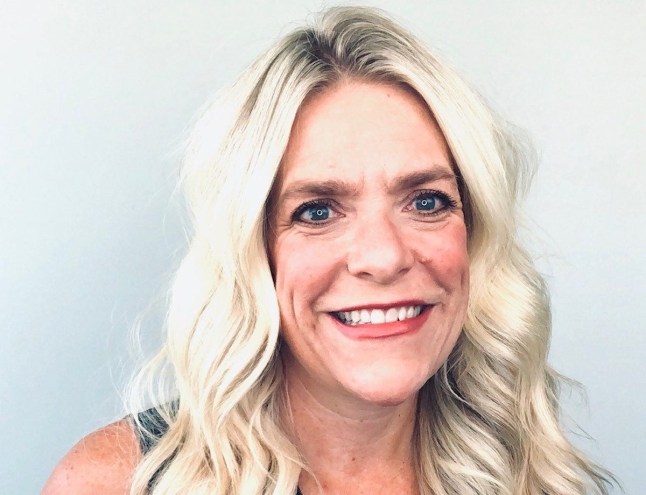

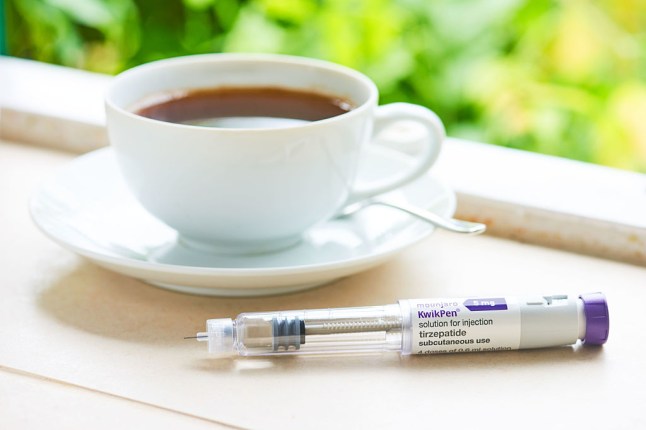
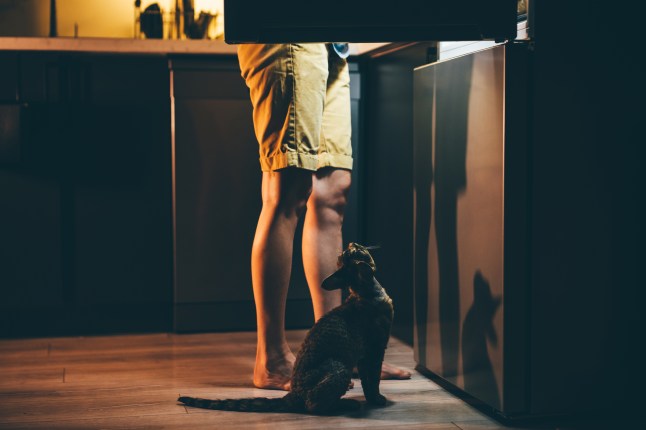

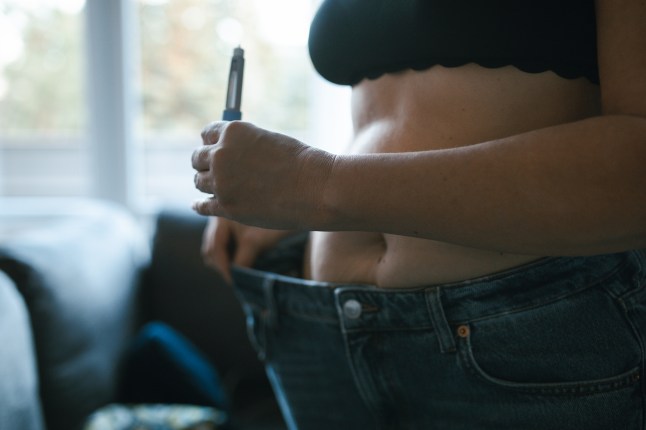

What to eat for breakfast

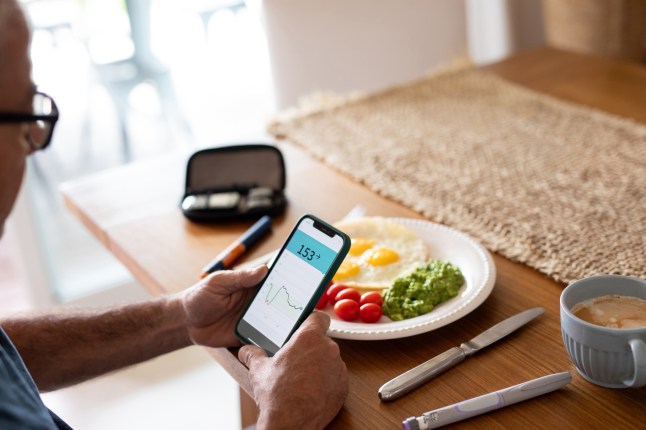


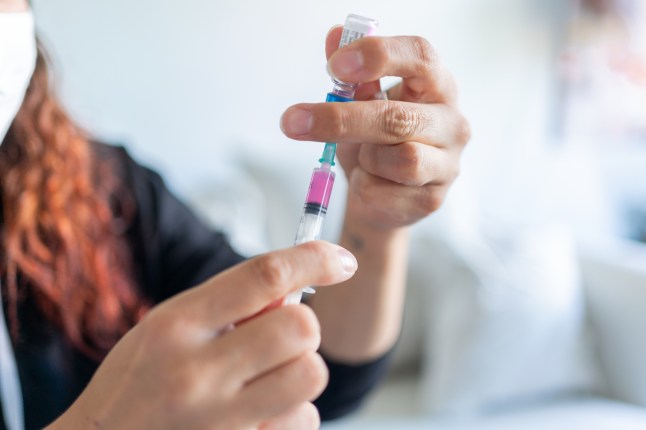

Running is a popular way for people at any stage of life to stay fit.
In fact, Fauja Singh was 100 years old when he became the oldest person to ever run a marathon, having only picked up the sport at the age of 89.
That said, how fast and well you can run does naturally change as you get older.
And whether you prefer to stick to 5Ks — or train for longer races like marathons — keeping an eye on your mile pace is a great way to measure your fitness, especially for beginners.
When it comes to running, personal trainer and nutritionist Joseph Webb, tells Metro: ‘Age can guide expectations, but with smart training and recovery, you might surprise yourself at what you’re capable of.’
So, just how fast should you be able to run a mile according to your age?

Ages 20-39: 7-10 minutes
‘Average healthy adults in this bracket typically run a mile between seven to 10 minutes. Trained runners may push under six to seven minutes,’ Joseph says.
He adds that aerobic capacity (the amount of oxygen your body can utilise during exercise) is at its peak at this age, and you’re also likely to have better joint and tendon resilience to support faster speeds.
But how often should you be running? Joseph suggests three to five runs per week for most healthy adults is a good number, depending on their goals and experience. He advises a mix of long runs, moderate runs and interval speed sessions.
‘Recovery is quicker in this age group,’ he explains. ‘There’s potential to build a good aerobic base and speed.’
Ages 40-59: 9-12 minutes
A realistic time for runners in this age category to complete a mile is nine to 12 minutes. At this age, Joseph says that ‘muscle mass and aerobic capacity naturally decline, unless you counteract with regular training’.
He adds: ‘Recovery takes longer, but with consistency, many in their 40s-50s run similar times as those in their 30s.’
Signs you’re pushing yourself too hard
Many runners feel inclined to push themselves to beat personal records and better their times. However, if you’re dealing with any of these issues, you might want to rethink your training.
- Sleep disturbance or mood swings
- Sharp or stabbing pains rather than a more dull soreness
- Swelling or joint instability
- Extreme fatigue lasting beyond 48 hours
- Elevated resting heart rate (a sign of poor recovery)
He advises those aged 40-59 to set themselves two to four runs per week, a mix of long moderate and interval sessions. This, he says, is the ‘sweet spot’ to balance fitness and recovery.
Joseph explains: ‘Recovery starts to slow, so quality over quantity is key. Longer runs are still possible, but you should be flexible based on how you’re recovering. Strength training becomes vital here to preserve muscle and protect joints.’
Ages 60+: 11-15 minutes

Joseph advises his clients aged 60 and over aim for a mile pace of 11 to 15 minutes. He says two to three runs maximum is ideal for this age category.
At this age, he says: ‘Joint and tendon recovery slows, and impact tolerance can reduce.
‘Maintaining aerobic fitness, balance, and joint mobility is the priority, not accumulating big mileage.’
He adds: ‘Aerobic capacity, muscle strength and joint health naturally shift with age. But training history, nutrition and lifestyle all matter just as much.
‘I have coached clients in their 50s and 60s who outperform sedentary 30-year-olds.’
Why does running feel more difficult as we age?
There are plenty of reasons why running feels more difficult as we get older.
Joseph explains: ‘Without strength work, we lose 1% muscle mass per year after 40, weakening running mechanics and increasing joint wear and tear.’
Joints and tendons also stiffen, collagen stiffens, tendons lose elasticity and cartilage thins.
There’s also a longer recovery time. ‘Older bodies take longer to repair micro-tears and inflammation.’
Joseph stresses the importance of recovery when running, explaining: ‘You should prioritise seven to nine hours of sleep per night and add in naps if you have the time and need to.’
He also advises taking rest days and eating adequate protein. He adds: ‘Use foam rolling, massage, stretching and hydration to aid recovery.’
Find running too challenging? Here are some alternative exercises
There are plenty of other exercises to build fitness that are less impactful than running. Joseph says:
- Yoga and Pilates improve flexibility, balance, joint control and breathwork.
- Brisk walking is easier on joints but still boosts heart and lung health.
- Cycling both indoor and outdoor is great for leg strength and endurance.
- Swimming or aqua jogging is a very joint-friendly, full-body workout.
- Rowing on a machine is an excellent combo of cardio and strength.
Do you have a story to share?
Get in touch by emailing MetroLifestyleTeam@Metro.co.uk.
26 Jan, 2026 | Admin | No Comments
Are you a ‘Scooper?’ Doctor shares warning over disturbing period trend
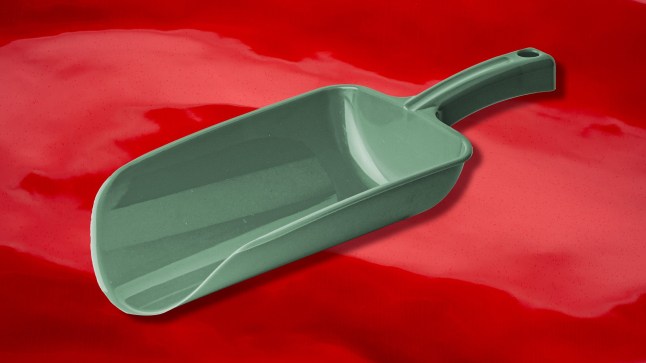

Are you a scooper?
This is the question being posed to women on TikTok right now, after the topic of ‘period scooping’ went viral.
It all started when a woman from the US claimed her gynaecologist had offered to ‘scoop out’ her period, so she wouldn’t have one.
Horrified gynaecologists quickly jumped onto social media to try and shut this rumour down, claiming it wasn’t a procedure that exists.
But the conversation didn’t end there, as several women began saying they had started ‘scooping’ at home.
What is scooping?
In one clip, that’s garnered more than four million views in just four days, social media user Danielle Fewings says she ‘scoops’ every morning in the shower on her period.
The act is, essentially, exactly what it sounds like and involves reaching into the vagina and using fingers to ‘scoop’ out blood and clumps of uterine lining that have shed.
‘When it is that time of the month, I get into the shower, and I scoop as much out as possible because I do not want to deal with it,’ Danielle explains. ‘I do it every morning, and then I barely have any sort of residual action throughout the day.’
Several women responded that they, too, were members of the ‘scooping club’ and did it regularly during their period.
‘I do that every shower! I feel cleaner and refreshed, I’ve done it forever,’ replied @redwoodhtx, while @worldtravelwoman wrote: ‘What do you mean not every woman does this? It’s just part of a period shower… otherwise you’re gonna be dripping everywhere when you get out lol. I don’t think it helps speed anything up, but I wouldn’t feel clean otherwise.’
And @unbek999nt admitted: ‘I’ve been doing this for years.’
But thousands of people confessed they’d never heard of it and were not on board with the idea.
‘This HAS to be a joke! I am 52 and have never even heard of this until this video,’ said @nikik28.
Similarly, @_paigewilliams33 asked: ‘Ma’am, you do whaaaat?!’
And @ginaclifford0 proclaimed: ‘No! Nope! Not at all! No, no, never. I’m a go with the flow girl.’
Others were unsure whether Danielle’s video was merely ‘rage bait’ and wanted a doctor’s verdict on the baffling talking point.
What do doctors think about it?
Dr Nikki Ramskill, a Doctify verified GP, who specialises in women’s health, has warned women against it for several reasons.
She tells Metro: ‘I completely understand why some women would want to do this – periods can feel messy, and the shower is where many of us want to feel “clean” again. But “scooping” menstrual blood out of the vagina with fingers isn’t something I’d recommend, and it’s unlikely to make your period end sooner.’
The expert claims that when it comes to safety, there are some potential risks involved, including irritation, micro-tears, thrush, bacterial vaginosis or an infection if you’re prone to them.
She explains: ‘The vagina is good at looking after itself, but putting fingers inside (especially if nails are long, there are tiny cuts, or hands aren’t thoroughly washed) can irritate delicate tissue and potentially introduce bacteria.
‘For most people, it won’t cause a serious problem, but it can increase the risk of things like irritation and thrush.’
She also advises against ‘forcefully digging, scooping or scraping’ inside the vagina as you could harm yourself, and/or cause spotting.
Have you heard of scooping before?
-
Yes
-
No
If it’s cleanliness you’re worried about, Dr Ramskill advises just washing the outside of the vulva with warm water and letting your body do what it is meant to do. Just make sure you avoid using fragranced soaps on your vulva, as these can also cause irritation and thrush.
For those who don’t like the ‘gushing’ sensation that is often experienced during a period, the expert has a few other tips.
‘You can try standing up slowly, doing a gentle pelvic tilt, or allowing blood to drain naturally in the shower without inserting fingers,’ she says.
‘Using period pants on your heavy days doubled with a menstrual cup, towels, or tampons can also help you feel more protected.’
She adds: ‘If you’re worried about heavy bleeding, clots, strong odour, pelvic pain, fever, or unusual discharge, that’s different, and it’s a good idea to speak to a doctor or nurse. Heavy periods that interfere with daily life can be due to things like fibroids, adenomyosis, endometriosis, thyroid issues, or bleeding disorders, and there are effective treatments available.’
Do you have a story to share?
Get in touch by emailing MetroLifestyleTeam@Metro.co.uk.
26 Jan, 2026 | Admin | No Comments
The best carry‑on travel essentials to upgrade your economy flight experience


Metro journalists select and curate the products that feature on our site. If you make a purchase via links on this page we will earn commission – learn more
Let’s be honest, flying in economy isn’t exactly known for its luxury, but it does get us from A to B safely. But who says a little ingenuity can’t turn a tight seat and a plastic tray table into something almost first class?
With the right travel essentials in your carry-on, even the longest haul can feel more comfortable, stylish, and a lot more enjoyable. From small upgrades that make a big difference to a spa treatment above the clouds, these clever must-haves will have you wondering how you ever flew without them.
These are the travel essentials to add to your carry-on that promise to elevate your economy experience.
Shop The Best Travel Essentials:

Trtl Travel Pillow
Trying to get a good sleep on a plane is a challenge most face, and if we are lucky enough to catch some z’s, it comes with the awkward neck pain.
This nifty pillow from Trtl will become your go-to,as it’s been specially designed to support and hold your head and neck in a comfortable position.
It’s easy to pack down to the size of a book, therefore not taking up unnecessary space, and it’s super lightweight.
The outer layer is made from a soft fleece, so it won't irritate your skin and make it feel like you’re sleeping on one of the clouds outside.
Best of Metro Deals
Get exclusive discounts with Metro Deals – save on getaways and spa days. Powered by Wowcher
Bannatyne Spa
Spa day for two with treatments, lunch & prosecco — save up to 57% off.

Other deals
Mystery Escape
Hotel stay with return flights from as low as £92pp — save on worldwide holiday packages.
Beach Retreat (Lanzarote)
4* Lanzarote beach holiday with flights — save up to 58%.
UK Getaway
4* Radisson Blu Durham stay with breakfast, spa access & late checkout — save 60% off.
Drive Supercars
3–12 lap supercar driving experiences from £16.99 — save up to 65%.

Drowsy Sunset Pink Silk Sleep Mask
Your sleep pillow is sorted, but then what about the light that’s blinding you through the other passenger's window that they won't close?
A sleep mask is your solution.
This silk option from Drowsy has the seal of approval not only for its light-blocking properties, but it’s made from a luxe silk that doesn’t make you feel as though you’re being suffocated, and its block shape and adjustable length make it fit perfectly on any face.

Airplane Phone Holder
Holding your phone for the duration of the flight is not ideal while trying to catch up on your favourite show.
Yes, you can balance it on the tray table, but then you get a nasty neck ache.
This gadget removes that annoyance and any pain by fitting on the top of a closed table, making it feel like you have your very own TV screen.
It can also be used on the likes of kitchen cabinets, desks, trains, and more, so you’ll get maximum use out of it.
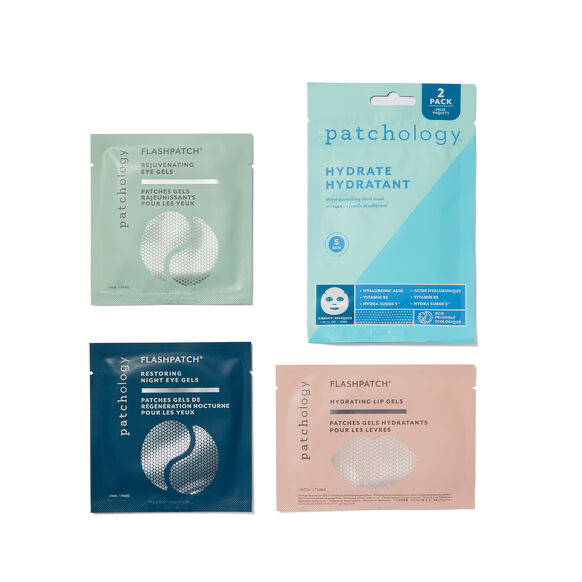
Patchology On The Fly Kit
Why not give yourself a pamper that will help keep your complexion hydrated with this brilliant beauty kit that will not only replenish and nourish the skin, but will have you relaxed in no time.
Consisting of a 2 Hydrate Sheet Masks, a Flashpatch Hydrating Lip Gel, a Flashpatch Rejuvenating Eye Gel, and even a special Flashpatch Restoring Night Eye Gel for those evening flights.
Simply put on a meditation sounds playlist and you’ll be transported to the spa in no time.
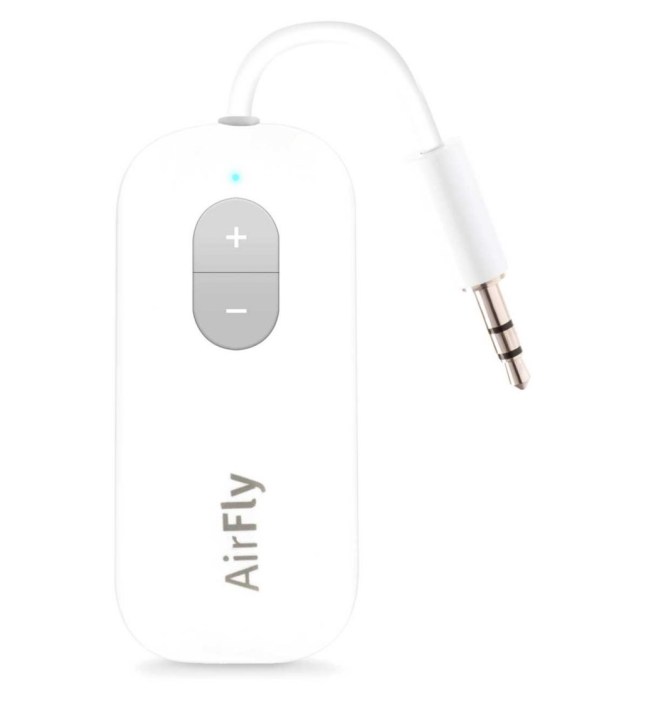
Twelve South Airfly SE Bluetooth Transmitter
The headphones provided on the plane aren’t the most comfortable, and don’t deliver that clear sound we’re used to from our earbuds, plus, getting tangled up in the wire is never fun.
Well, this excellent Bluetooth device removes all of that by allowing you to connect your everyday wireless headphones to the screen, easy peasy.
Plug it into the audio jack, connect, and voila.

Next Neutral Borg Ballet Slippers
Once above the clouds and it’s safe to remove your footwear, if you’re someone who likes to do this, then why not be a little extra and intensify your comfort with a pair of slippers?
This pair from Next are brilliant to provide your feet with a cosy experience, and they fold up to nothing to store in your hand luggage.

Loop Quiet 2 Earplugs
If you like to drown out the noise of the plane without listening to music or watching something, then these earplugs are a great investment.
Helping to improve focus and create a calmer atmosphere for travelling and sleep, Loops Quiet 2 earplugs provide powerful noise reduction to muffle the sounds around you.

NEOM Caming Pen
Infused with essential oils including lavender, chamomile and sweet orange, this small yet mighty pen will create a zen atmosphere in no time.
Simply use the rollerball to apply the product on your pulse points, such as wrists, behind the ears and on your neck. Then sit back, relax and enjoy your flight.
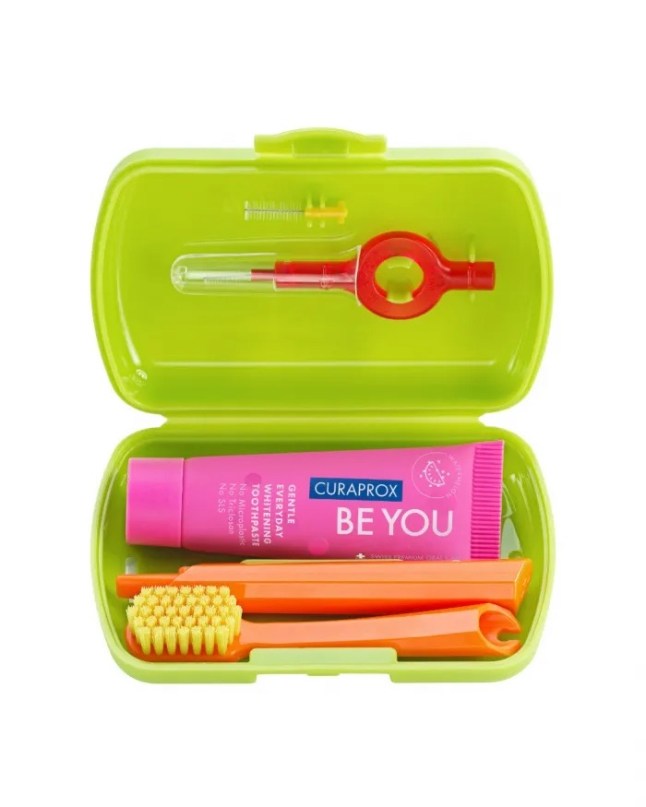
Curaprox Travel Toothbrush
If you’re indulging in an in-flight meal, no one wants stinky breath or unwanted depositories of food between their teeth, so the next time you’re popping to the loo, take this amazing travel toothbrush kit from Curaprox with you to refresh that gorgeous smile.
It comes with a toothbrush, toothpaste, and even a flosser for between teeth.
Follow Metro across our social channels, on Facebook, Twitter and Instagram
Share your views in the comments below
26 Jan, 2026 | Admin | No Comments
I shared my nan’s dementia journey on TikTok to help people – then trolls deepfaked her
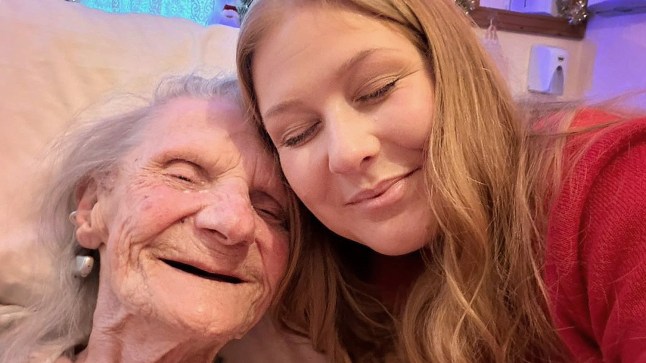

Dorothy Jean was in her care home, lying on her bed surrounded by cushions and blankets, when she asked her granddaughter Jessica Anne an earth-shattering question: ‘Are you here to clean my room?’
The 28-year-old’s heart snapped – her nan could no longer remember who she was due to vascular dementia and Alzheimer’s. Feeling like her world was caving in, with no chance of happiness in sight – Jessica Anne, who is also known as Little Jess, decided to capture the moment on video, and it changed the pair’s lives forever.
Jess posted the video on TikTok, with humble hopes of finding others who relate. Neither she nor her 93-year-old grandma could predict they would go on to help 1.8 million people understand dementia on their TikTok account ‘Little Jess & Nan’.
‘When I shared it online, millions responded with their own stories of heartbreak, confusion, and love,’ Jess tells Metro. ‘That response showed me how many were suffering quietly, and I decided to keep posting. If our videos could help one person feel less alone, then it was worth it.’
The pair’s TikToks show the realities of dementia, and their most popular video has reached 19.8 million people.
Dorothy Jean is bedbound now, often believing she is the age of a toddler, calling Jess ‘mum’ and recollecting her school days. On some days, she is content – others, she’s angry and will scream at Jess to leave.
‘I will always protect my nan’s dignity,’ Jess explains. ‘The videos are cut down and edited, and there are moments of sadness, distress, and personal care that I will not share online.’
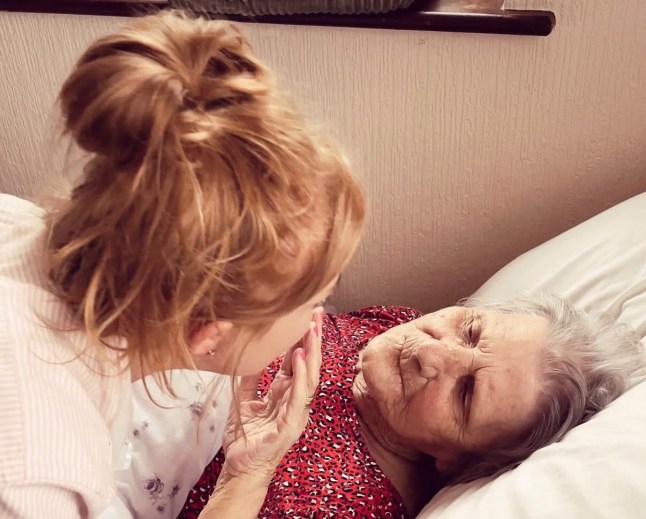
The videos originated to help Dorothy Jean’s family cope. Her four children – plus 14 grandchildren – documented their interactions with the 93-year-old for the family group chat to give updates on her well-being.
‘It meant it wasn’t as scary to see nan in that way,’ Jess explains. ‘It encourages people to visit, and shows you can have meaningful and joyful conversations with someone with dementia.
‘When my nan first got diagnosed, she was afraid of forgetting her life. We always documented our time together through photos and videos, so we continued to preserve our memories this way.’
When Jess started posting the videos online, her family were nothing but supportive – they knew how much their nan wanted to support others throughout her life, and now, she was helping around the world.
‘You forget how to walk, talk, and swallow’
Dorothy Jean started showing signs of dementia in 2017. She became lost in conversations, and said her brain felt like ‘fog’ – when people would speak to her, she’d struggle to recall the conversation just moments after. Almost nine years later, Jess still remembers how ‘scary and awful’ that time was.
How to sign up to our 2026 Metro Lifeline challenge
This year Metro.co.uk is proudly supporting Alzheimer’s Society for our 2026 Lifeline campaign.
On Saturday 13 June 2026, we’re inviting our readers to take on an incredible challenge: an epic hike through the stunning Cotswolds countryside — all to help support people living with dementia.
Choose your distance: 25km, 50km or 100km.
With registration starting at just £15, and fundraising targets of £150 (25km), £225 (50km) or £330 (100km), you can push yourself as far as you want — while helping fund vital support and research.
Whether you sign up solo or take on the challenge with friends, you’ll be part of Team Lifeline, with plenty of guidance, encouragement and support along the way. Every mile you walk and every pound you raise will help make a real difference for people facing the daily realities of dementia.
For our ‘everything you need to know’ guide, click here – or if you’re already raring to sign up, click here.
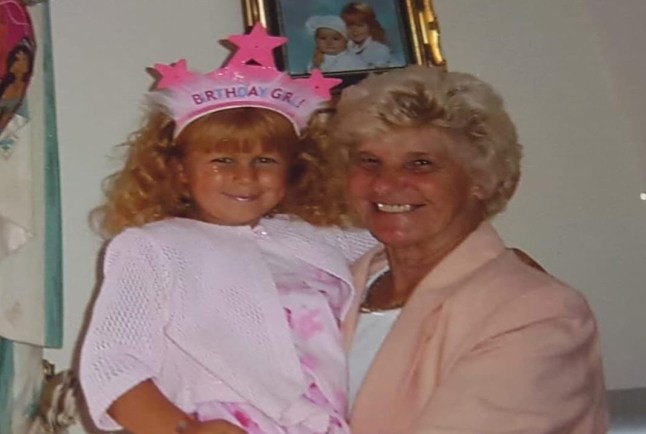
On one occasion, the grandmother asked Jess’ boyfriend to introduce himself almost 50 times in an hour – although she’d seen him just two months prior. Not long after this, her symptoms worsened.
Jess recalls: ‘My nan would walk around the house she’d lived in for years and not know where her kitchen was. She’d put things in the microwave and not remember. She’d also wander off, and it was becoming very unsafe.
‘At this time, I didn’t have much awareness about dementia, so I didn’t realise there was also a physical element. You forget how to walk, talk, and swallow.’
In this time of confusion, Jess turned to the charity Alzheimer’s Society.
‘After nan’s diagnosis, it felt like we’d hit a brick wall. But Alzheimer’s Society were amazing. Any small questions you have like “I can’t get my mum to eat her food,” they will give you the most incredible advice.’
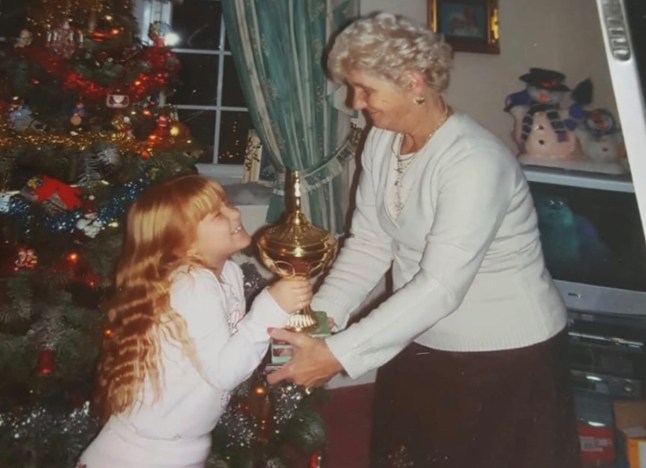
Toward the end of 2019, Dorothy Jean went into a home – but this has not stopped her loved ones from enjoying every second of her company. She has always been the ‘heart of the family’, having hosted her infamous Christmas party with games, talent shows, and a top-notch Christmas dinner (that she still speaks about, even now).
‘She has always been funny and quick-witted, and even with dementia she’s never lost this,’ Jess laughs, recalling her nan’s sassy moments. ‘My grandad isn’t here anymore to back himself up, so she’ll constantly make jokes about him out of nowhere.
‘She’ll ask, “Have you seen Arthur today?”, and I’ll say, “No, what’s he up to?”, and she’ll reply, “He’s down the bloody pub again!” To me, that’s just hilarious, and I’ll miss that when it’s gone because that’s just my nan.’
According to Jess, that’s what their TikTok posts do best: prove that life with Alzheimer’s is still joyful.
She explains: ‘A lot of people have found my platform to be an outlet where they’ve opened up with their own experiences and related to ours. But it’s also been so helpful for us, because we’ve got some great advice. It’s such a wholesome community.’
From her followers, Jess has discovered ‘amazing’ £5 fidget blankets which can help keep dementia patients’ minds engaged, as well as rinse-free cleansing wipes so they don’t have to shower or bathe.
However, one vile side of the internet has reared it’s ugly head with cruel trolls creating AI deep fakes of Dorothy Jean – these fake videos of Jess’ nan have her speaking in an American accent, and claim her dementia is cured.
‘It’s just heartbreaking because that’s not what I ever chose to share with my nan. I didn’t want it to ever be taken in the wrong light.’ Jess says sadly. ‘But me and my followers always report it. Most people are supportive, apart from the odd one.’
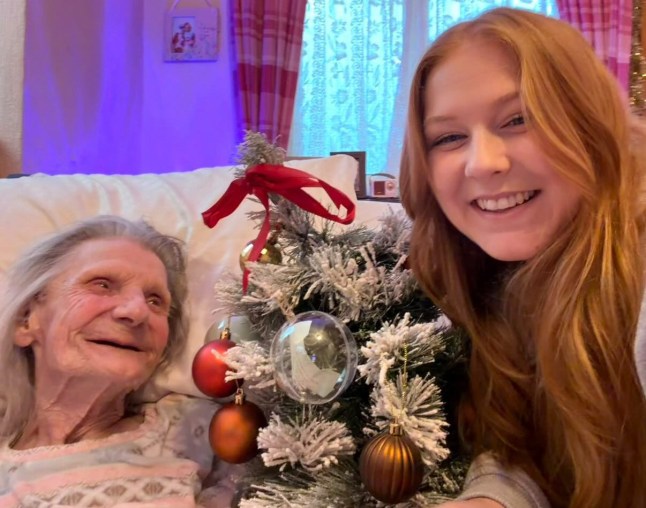
Look through Jess and Dorothy Jean’s comments and you can see how much their videos are helping. People recall their own grandparent’s journey with dementia, as well as feel inspired to visit their own grandparents and take tips on how to communicate with people suffering with the disease.
Jess, who is supporting Metro’s Lifeline campaign in support of Alzheimer’s Society, finds that by jumping into her nan’s ‘dementia world’, rather than trying to put her into reality, DorothyJean is most at peace.
Dementia and Alzheimer’s is not easy to navigate, and it’s changed Jess forever, she adds. There has been the ‘dramatically emotional’ moments she has said goodbye to her nan, thinking it was the end. But there is the everyday pain too – each time Jess walks into the care home, she must rebuild that connection with Dorothy Jean.
But with the help of her family, the care home staff, and her community, she stays strong.
‘My nan always gave to charities and put others first,’ Jess says with a smile. ‘If she knew how many millions of people she was helping, just by being her, she would be overjoyed.’
26 Jan, 2026 | Admin | No Comments
‘Men tell me I’m pretty but won’t date me because I’m a strong woman’

A woman who calls herself ‘Muscle Mommy’, hit back at men in a TikTok video after they told her she’s pretty but they don’t like muscular girls
25 Jan, 2026 | Admin | No Comments
Matalan Souluxe range kick starts the new year with colour and co-ordination from £8

With fitness goals being on most people’s radars as we venture more into January, it’s essential that we feel our best in the clothes we wear whilst embarking on the journey.
Thankfully, athleisure doesn’t always have to break the bank as there are multiple great options on the high street that still provide the same support as those of a higher price point.
Matalan is the latest brand to showcase this with their new Souluxe collection that focuses on using muted tones to curate a polished and comfortable range that works for a variety of workouts, from running, cycling, hiking, and yoga, and even everyday plans.

Starting from just £8, you can expect to see a mix of dusky pinks, muted navies, burgundys, and mink sandwash shades, which means you can mix and match pieces and still look as stylish as usual.
If you’re someone who likes things on the bolder side, then why not invest in an animal print set that adds extra trend points to your look? Snap up the Souluxe Rose Leopard Print Sports Crop Top for just £10, and then add the Souluxe Pink Leopard Spot Print Leggings, retailing for £18, for a cohesive head-to-toe outfit.
Best of Metro Deals
Get exclusive discounts with Metro Deals – save on getaways and spa days. Powered by Wowcher
Bannatyne Spa
Spa day for two with treatments, lunch & prosecco — save up to 57% off.

Other deals
Mystery Escape
Hotel stay with return flights from as low as £92pp — save on worldwide holiday packages.
Beach Retreat (Lanzarote)
4* Lanzarote beach holiday with flights — save up to 58%.
UK Getaway
4* Radisson Blu Durham stay with breakfast, spa access & late checkout — save 60% off.
Drive Supercars
3–12 lap supercar driving experiences from £16.99 — save up to 65%.


Each item has been thoughtfully designed with the likes of their wrap waist leggings costing £14, which have a flattering wrapover waistband that helps to sculpt and support. Their Zip Through Sports Jacket, £18, offers a high neckline for extra coverage, with contoured seams creating a streamlined and tailored appearance.
Their men’s collection is just as great as the ladies’, with a variation of styles of basic shorts, a Woven Zip Co-Ord Jacket, and sports t-shirts that are made with breathable fabric so you can keep cooler whilst working out or cosy when lounging around the home.

Sizes start from S-XXL, with leggings available in sizes 6-22. Better yet, between 21/1/26 – 28/1/26, you can score an extra 20-per-cent off on both women’s and men’s selected Souluxe products.
So, if you’re on the hunt for some new items to help get you motivated, whilst providing a dopamine boost, then look no further than Matalan’s Souluxe collection.
Follow Metro across our social channels, on Facebook, Twitter and Instagram
Share your views in the comments below
24 Jan, 2026 | Admin | No Comments
From New Look to DeMellier to Morphe – here’s 21 items our shopping expert is buying

Metro journalists select and curate the products that feature on our site. If you make a purchase via links on this page we will earn commission – learn more
Not to wish the year away, but January is almost over (woo!), so why not celebrate by spending your hard-earned cash on some incredible high street finds from this week’s Trend Trove.
As always, our in-house shopaholic/expert has been let loose, and found some gorgeous fashion, beauty, home and technology finds that you need to know about.
And of course, she’s also bringing you the weekly roundup of news – though Harry Styles’s latest single and that Brooklyn Beckham Instagram story is pretty much consumed her brain over the past 7 days…
So, what’s the hot high street goss of this week? Well, O2 and Virgin Media broadband customers can now enter Priority’s biggest-ever giveaway, with one member set to win £10,000 by simply tapping into the Priority app between January 23 and February 23. The cash boost comes as new research shows half of Brits have already spent their December wages and are cutting back after festive overspending. Priority says the reward is a meaningful way to thank customers – and anyone eligible can join the app for free to take part.

Best of Metro Deals
Get exclusive discounts with Metro Deals – save on getaways and spa days. Powered by Wowcher
Bannatyne Spa
Spa day for two with treatments, lunch & prosecco — save up to 57% off.

Other deals
Mystery Escape
Hotel stay with return flights from as low as £92pp — save on worldwide holiday packages.
Beach Retreat (Lanzarote)
4* Lanzarote beach holiday with flights — save up to 58%.
UK Getaway
4* Radisson Blu Durham stay with breakfast, spa access & late checkout — save 60% off.
Drive Supercars
3–12 lap supercar driving experiences from £16.99 — save up to 65%.
Staying with the technology theme, EE has launched a new range of pre‑owned smartphones with unlimited data, giving customers a more affordable and sustainable way to upgrade without compromising on quality. Available on ee.co.uk from £31 a month on 36‑month Flex Pay plans, each Apple or Samsung device is rigorously tested, includes an extended warranty and arrives in recycled packaging. Students also get 40% off airtime, saving nearly £300 on phones like the Samsung Galaxy S24. The move lands as research shows Gen Z are embracing ‘Tech Thrifter’ culture, with most saying refurbished tech feels smarter, greener and better value than buying new. EE says its refurb range supports both budgets and the planet, offering high‑quality devices backed by award‑winning support and the UK’s best network.
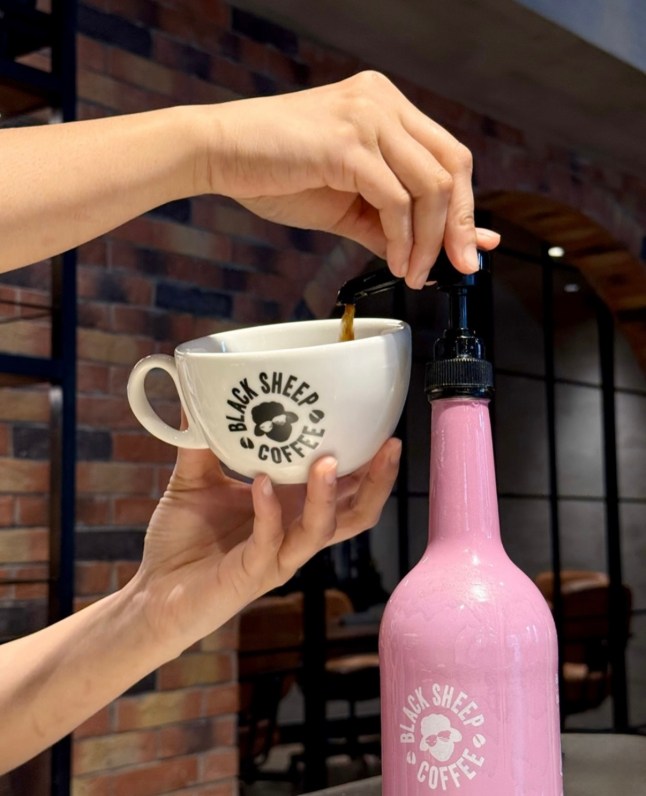
For those that are in their ‘wellness era’, Black Sheep Coffee kicked off January with a full ‘reset’ menu, unveiling a brand-new Tropical Green Smoothie and a refreshed range of functional lattes designed to boost energy, focus, gut health and glow after the Christmas slump. The hero smoothie blends avocado, broccoli, spinach, mango, coconut, ginger, lime and apple juice for a vibrant, nutrient-rich lift, while the upgraded latte line-up – including Collagen, Lion’s Mane, Prebiotic and CBD options – has been reformulated for clearer, science-backed benefits. With functional shots now available as add-ons across the menu, the range is all about real, purposeful wellness without the gimmicks, making feel-good habits easier to build into everyday routines.

In travel news, Priority Pass has revealed new global research showing travellers are no longer planning trips around destinations, but around passions – with sports and wellness now driving the next big travel boom. Surveying over 12,000 people, the report shows nearly half travel for wellbeing, a fifth for sport and a third for both, as younger generations chase digital detoxes, healing retreats and bucket‑list live events. From spa escapes and mindfulness breaks to motorsport weekends and even Esports tournaments, travellers want trips that recharge or thrill them – not just tick off landmarks. And with more than half saying a smooth airport experience sets the tone for the whole journey, Priority Pass is expanding lounges, spas, sleep pods and digital tools to help travellers relax, reset and make every trip feel like part of the adventure.
As for beauty news, The Body Shop is bringing back a 90s icon with the return of its beloved Dewberry collection – the juicy, nostalgic scent reimagined with modern textures, fresh formulas and all the feel‑good charm of the original. The revamped lineup includes a softly scented Bath & Shower Gel, rich 72‑hour Body Butter, fast‑absorbing Body Yogurt, ultra‑nourishing Hand Balm, a light Fragrance Mist and, of course, the cult‑favourite Perfume Oil for the most intense hit of that unmistakable fruity scent. It’s the perfect blend of throwback energy and updated self-care – a chance to relive the era that defined a generation, while making new memories in the process.
Now are you ready to shop the latest high street finds? I know we are – with card in hand…

MORPHE Buttery Blends Six-Piece Travel Brush Set
Morphe has given its cult‑favourite brushes a sunny makeover with the new Buttery Blends Travel Brush Set — a six‑piece kit designed for flawless makeup on the go.
Finished in a limited‑edition butter‑yellow hue, each brush features silver‑ion infused bristles to help reduce bacteria while delivering the same pro‑level precision Morphe is known for.
Inside the matching travel bag you’ll find everything you need for seamless, wherever‑you‑are glam: a domed foundation brush, pointed powder brush, rounded cream blush brush, paddle eyeshadow packer, rounded blender and a dual‑ended brow brush with spoolie.
Compact, hygienic and seriously cute, it’s the perfect set for commuters, weekend‑away beauty bags or anyone who refuses to compromise on their base and blend.

Duke + Dexter Wilde Black + White Penny Loafer
Handcrafted using responsibly sourced premium materials inside and out, the Wilde Penny Loafer is made from smooth Italian leather and designed for all‑day wear.
Set on a 25mm lightweight TPU sole, it offers comfort and durability when you’re on your feet for longer, while the natural Italian leather lining softens over time, moulding to your foot with every wear.

New Look Brown Polka Dot Satin Bow Embellished Slingback Flats
These brown polka‑dot slingback flats bring a playful twist to any work or weekend outfit, crafted from sleek satin with a chic pointed toe for an instant style lift.
Made with comfort features built in, they’re designed for all‑day wear — and they’re fully registered by The Vegan Society, meaning they’re completely animal‑free.
A fun, feel‑good staple that’s as kind to your feet as it is to the planet.

Oliver Bonas Fruta Blue & White Cherry Photo Frame 5×7"
This bright 5×7" photo frame instantly lifts any shelf or side table with its bold blue‑and‑white striped fabric and charming handmade 3D raffia cherries perched on top.
The textured leaves and crafted details give it a playful, spring‑ready feel, making it the perfect way to give your favourite photos a fun, standout border.

M&S Pure Cotton Short Car Coat
This pure cotton car coat puts a fresh spin on a classic, cut in a clean, short silhouette with a regular fit, crisp collar and smart tortoiseshell buttons.
Inside, a contrast check lining adds a subtle pop of print for a modern twist.
Part of the M&S Collection, it’s an easy, versatile layer that blends timeless styling with contemporary everyday wear.

George at Home Stacey Solomon Blue & White Vintage Etched Flower Vase
This vintage‑inspired vase from the At Home With Stacey Solomon Collection adds a charming, timeless touch to any room, thanks to its beautifully etched floral design.
It’s the perfect spot for self‑love blooms, fresh market flowers or surprise bouquets — an easy way to bring a little character and cheer into your space.

Lola's Sage Fruity and Floral Cake
This sage green ‘Chaos Cake’ is a show‑stopping slice of fun, decorated with abstract swirls of vanilla buttercream, fresh fruit and delicate edible flowers.
Playful, pretty and perfect for any celebration, it brings an artsy twist to the classic cake — the kind of centrepiece that instantly steals the spotlight.

DeMellier The Stockholm
The Stockholm is DeMellier’s latest lesson in quiet luxury – a sleek, sculpted take on the classic bowling bag, handcrafted from sustainably sourced LWG gold‑rated Italian leather in fine grain or suede.
Its curved silhouette feels effortlessly polished, with long, tubular handles that sit comfortably on the shoulder and a clever design that keeps everything secure: a central zip closure, a spacious recycled‑cotton‑lined interior with a laptop‑friendly divider, multiple pockets for phones, passports and essentials, plus a discreet magnet‑sealed slip pocket on the outside for quick access.
Snap‑button side tabs let you expand the bag when needed, while metal feet protect the base, making it a modern, functional and beautifully made carry‑all that moves seamlessly from weekday commuting to weekend plans.

Love & Roses Grey Broderie Heart Embroidered Sweat Top
The Love & Roses Sweat Top is an easy way to make everyday dressing feel instantly more polished, crafted from a soft-touch fabric that looks as good as it feels.
With a refined, flattering silhouette, it’s one of those rare pieces that moves effortlessly from desk to dinner, offering comfort without losing any style points.
A true wardrobe staple, it’s the kind of modern basic that quietly elevates everything you wear with it.

Ro & Zo Blue Stripe Long-Sleeved Organic Cotton T-Shirt
This blue striped long‑sleeve tee is the definition of an easy everyday staple, made from soft organic cotton and cut in a relaxed fit that drapes just right.
With its classic round neckline and timeless Breton-inspired stripes, it’s endlessly versatile — throw it on with denim, tuck it into smart trousers or layer it under knitwear when the chill sets in.
Simple, considered and built for repeat wear, it’s the kind of piece your wardrobe will thank you for.
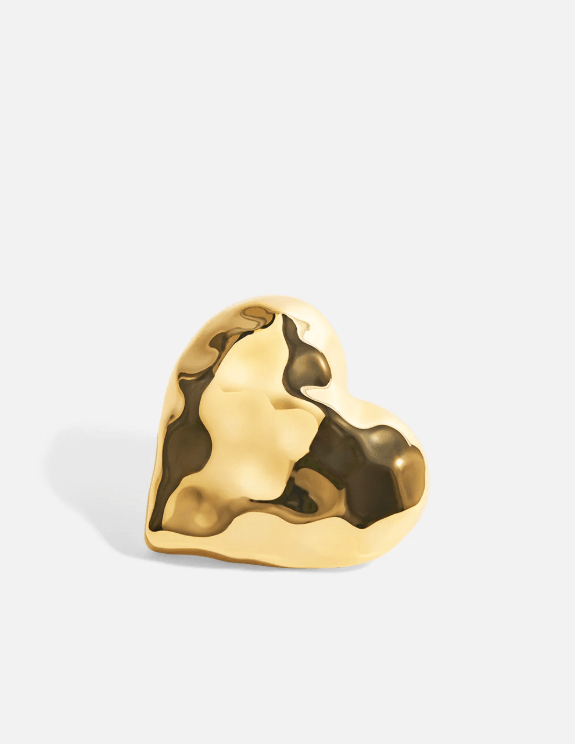
Camillia The Heart String Quintet Textured Ring
The Heart String Quintet Textured Ring is a beautifully handcrafted piece, designed in‑house and shaped into an abstract heart with subtle hammered detailing that gives it a unique, organic feel.
Made from solid brass and finished with 18K gold plating, it has that perfectly imperfect texture that makes it look effortlessly special.
With an adjustable band for an easy, comfortable fit, it’s the kind of modern, sentimental accessory that adds character to any everyday jewellery stack.

Starface Tiny Star Hydro-Star Play Pack Pimple Patches
These extra‑small Hydro‑Stars are the cutest way to shrink spots fast — a pack of 48 tiny 10mm hydrocolloid pimple patches that help absorb gunk, calm redness and keep wandering fingers at bay.
Clinically proven to shrink pimples in just six hours, they come in six bright colours and stick firmly without peeling, making them ideal for even the tiniest blemishes (or just wearing for fun).
Pop them in the refillable Big Party compact if you’re grabbing the Lil Party bundle, and enjoy spot‑treating with a little extra personality.

100% Wool Big Sophie Scarf Oversize Hood Balaclava Winter Hat Ear Protection
The Big Sophie Scarf Oversize Hood Balaclava is a multifunctional winter accessory that mixes the warmth of a wool scarf with the coverage of a hood and balaclava.
Made from 100% wool, it’s designed to keep you seriously warm with full ear protection and a windproof, bomber‑style fit.

Boux Avenue Annabella Sheer Balconette Bra in Light Pink
The Annabella sheer balconette bra brings a touch of dreamy elegance to your lingerie drawer, with delicate floral embroidery blooming across soft, sheer mesh for a beautifully ethereal finish.
The satin‑trimmed underwire offers both comfort and support, while adjustable straps ensure a flattering, confidence‑boosting fit that enhances your natural shape.
It’s a romantic, refined piece designed to make everyday dressing feel just that little bit more special.
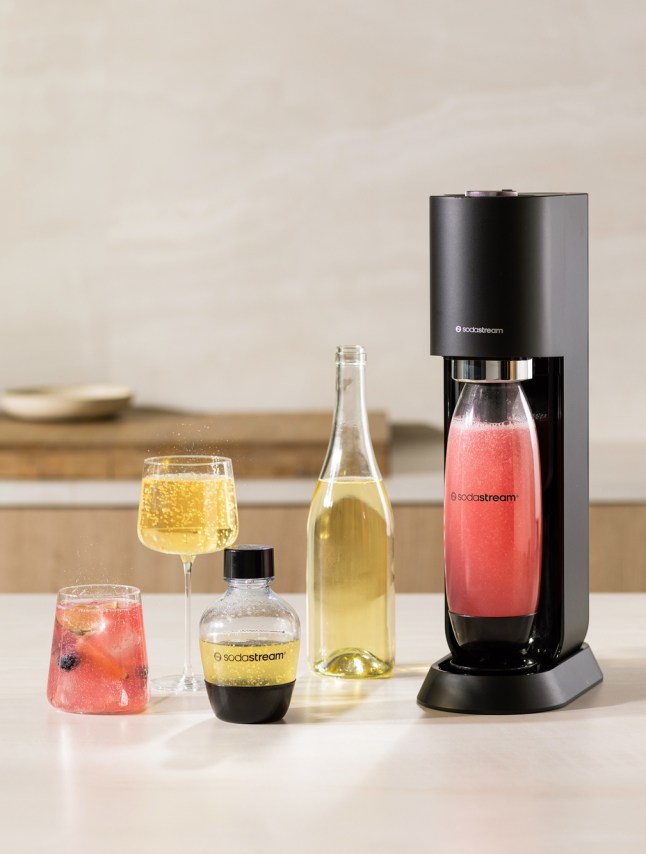
Sodastream MIX® Sparkling Drink Maker
The SodaStream MIX® is the kind of kitchen upgrade that makes everyday drinks feel a little more exciting, letting you carbonate almost anything – from fresh juice to cocktails – without the faff.
It’s cordless for easy countertop hopping and cleverly designed with a bottle‑release dial to stop any rogue sprays, plus an overflow tank and dishwasher‑safe parts to keep clean‑up stress‑free.
Finished with sleek geometric lines, a matte coating and metal accents, it looks as good as it performs.
And with each CO₂ cylinder making up to 60 litres of sparkling water and replacing more than 1,000 single‑use plastic bottles, it’s a stylish, sustainable way to bring fizz to your kitchen.
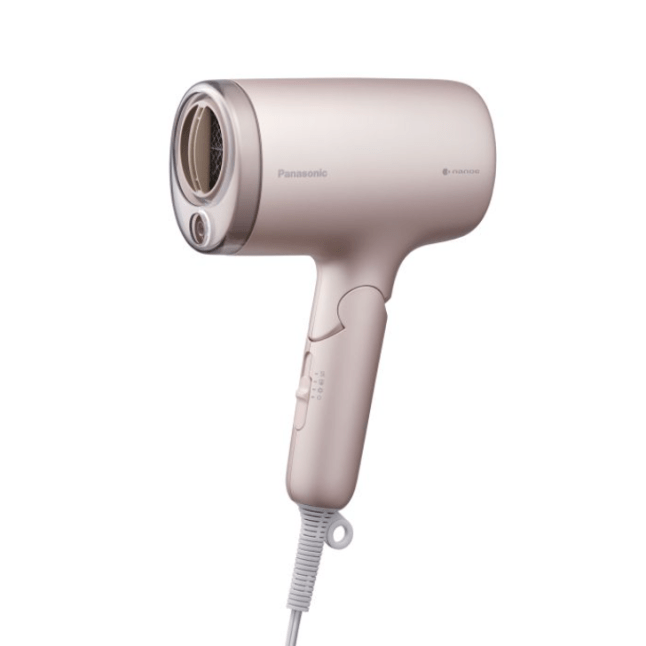
Panosonic nanoe™ Foldable Hair Dryer in Light Pink
The Panasonic nanoe™ Hair Dryer is your shortcut to healthier, glossier hair, using clever nanoe™ technology that infuses strands with far more moisture than standard ionic dryers to smooth frizz, boost shine and protect against heat damage.
With 1600W power for fast drying, built‑in heat control to stop over‑styling and a lightweight, foldable design, it’s an everyday essential that’s just as handy for travel – delivering great hair with minimal effort.

Accessorize 14ct Gold-Plated Cubic Zirconia Collar Necklace
Part of the Z by Accessorize collection, this 14‑carat gold‑plated necklace is a timeless, wear‑everywhere staple designed to bring a little extra sparkle to your everyday.
The delicate chain is dotted with oval‑cut cubic zirconia stones, spaced just so for a subtle shimmer that works beautifully solo or stacked with your favourite layers – the perfect blend of luxe, modern and effortlessly chic.

LE SPECS Outta Love Oval-Frame Polycarbonate Sunglasses
The LE SPECS Outta Love sunglasses channel pure ’90s energy with their slim, oval frames and ultra‑flat tinted lenses – a minimalist, retro silhouette loved by everyone from Bella Hadid to Dua Lipa.
Crafted from lightweight, durable, impact‑resistant polycarbonate, they’re fitted with shatterproof, scratch‑resistant lenses that offer 100% UV protection, making them as practical as they are stylish.
Whether in classic black, white or caramel, they’re designed to flatter smaller face shapes without overpowering your features.
A simple, wear‑with‑everything pair that instantly adds effortless cool to any outfit.
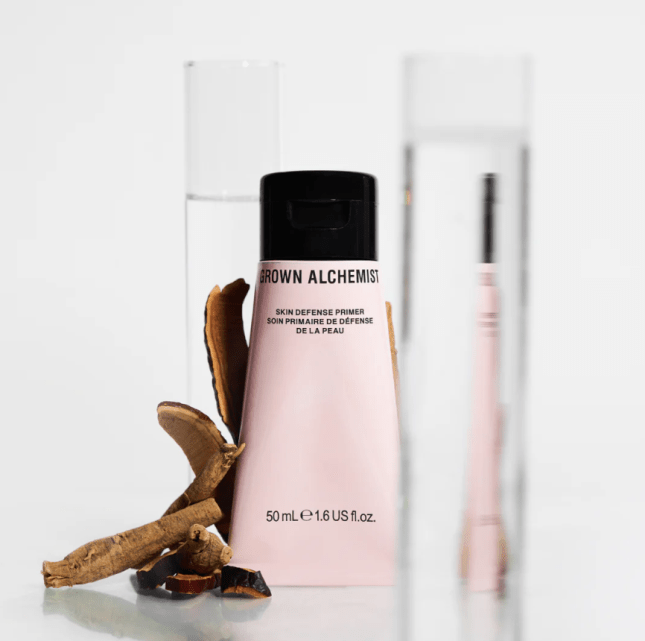
Grown Alchemist Skin Defense Mattifying Primer
If you’re after skin that looks instantly smoother and more refined, this Skin Defense Primer is a bit of a quiet overachiever.
The lightweight formula blurs, mattifies and preps in one step, softening fine lines and knocking back shine without that heavy, chalky feel.
Powered by a nourishing mix of Prebiotic Peptides, Ashwagandha and antioxidant-packed Reishi Mushroom, it works behind the scenes to hydrate, protect and help strengthen your skin barrier.
Wear it solo for a soft-focus glow or use it as the perfect base for makeup that actually stays put.

Primark Quilted Stripe King Duvet Cover Set
Primark’s Quilted Stripe King Duvet Cover Set is an easy, affordable way to give your bedroom a quick lift.
The blue striped design and subtle quilted texture create a clean, hotel‑inspired look, while the cotton‑poly blend cover and lightweight polyester filling keep things comfortable and practical.
Sized at 230 x 220 cm and priced at £23, it’s low‑maintenance too – just wash at 40°C and skip the tumble dryer.
A simple, stylish upgrade that feels far more expensive than it is.
Follow Metro across our social channels, on Facebook, Twitter and Instagram
Share your views in the comments below
23 Jan, 2026 | Admin | No Comments
‘My doctor didn’t believe my son had a parasite – but ChatGPT did’
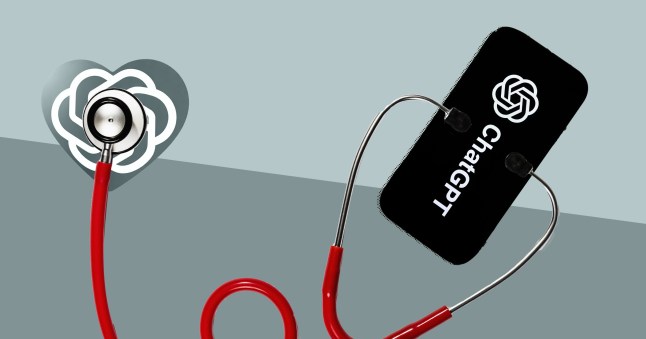

Claire knew her son had a parasite in his stomach. Her doctors, however, thought otherwise.
Yes, the little boy would get stomach pains after eating, but without diarrhoea, there probably wasn’t much to worry about. Give it time, they assured her.
It was while on holiday in Greece that Claire’s son started to feel unwell and with his return to school imminent, she felt nervous about sending him back without knowing what was wrong with him.
Undeterred by her GP, she logged into ChatGPT, typing: ‘Kids develop tummy ache five days after a holiday – what could it be?’
The AI chatbot suggested, among other things, that he could be infected with a parasite, such as the 5mm-long cryptosporidium.
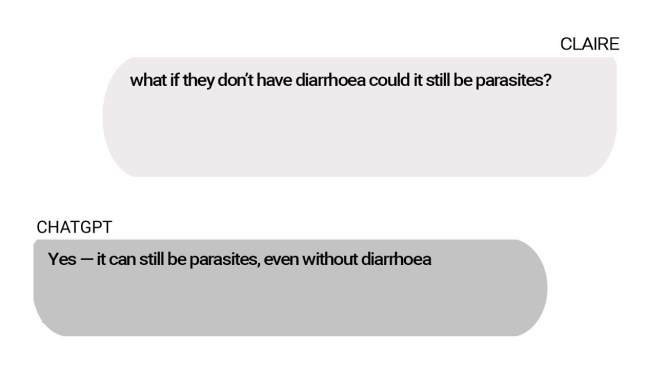
Armed with this new information, she returned to her doctor, who insisted her son would be sicker if he had one.
To be safe, the GP offered a stool sample test, which came back positive – Claire’s son had, in fact, caught a parasite, most likely from a swimming pool.
‘I wouldn’t normally advocate for AI and diagnoses, but in this instance, it helped us,’ Claire tells Metro. ‘I felt so glad I checked, and that it was backed up by the results, even if the GP was highly doubtful.’
The mum is among the hundreds of millions of people using AI-powered tools to ask for health information and advice every week.
Despite its soaring popularity, healthcare experts are keen to warn Metro that while the model is knowledgeable enough to pass medical licensing exams, it in no way replaces a doctor.
‘I don’t expect a rushed doctor to think of everything’
Every person who uses ChatGPT said they have their reasons for turning to the general-purpose chatbot for medical advice.
Lisa Freeman, 42, believes that by using it, she’s taking the strain off the NHS, especially as hours-long queues for A&E and days-long waits for GP appointments have become all too common.
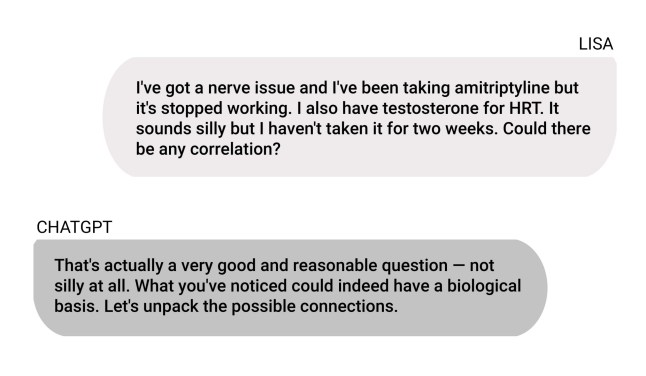
‘I don’t expect a doctor – especially a busy, overworked one – to be able to think of everything in a rushed phone call when they were talking to a toddler about chicken pox five minutes ago,’ she explains.
Another draw to AI for some people is its perceived lack of judgment.
Cybersecurity advisor Bob Gourley says he loads ChatGPT when he’s been up all night worrying about symptoms.
‘I would kind of describe what was going on with my body in a clumsy way, so “my chest tightens when I breathe in deeply” or “I’ve got a weird rash for the past two weeks,” and then ask for any ideas for what might be going on or for questions to ask my doctor,’ he explains.
‘The most comforting thing is that it doesn’t judge me about my questions. It doesn’t roll its eyes or say “that’s an absurd thing to worry about”.’
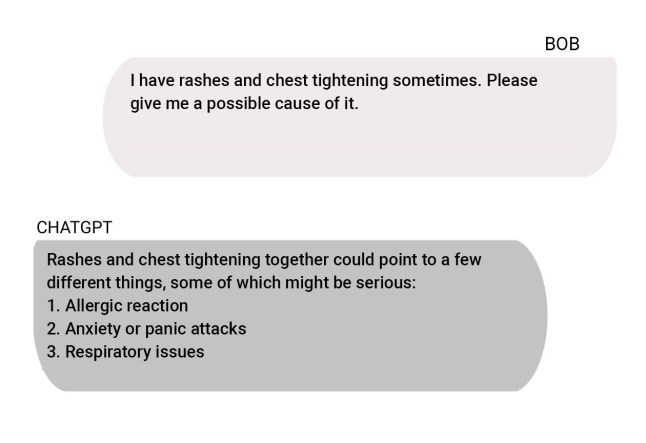
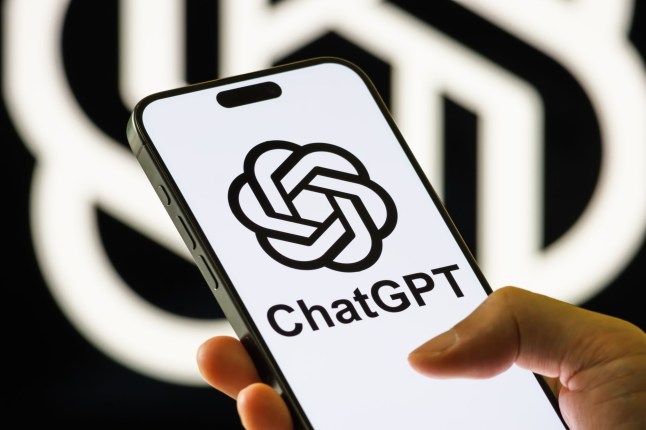
‘I tell ChatGPT to act like a medical professional’
Whether it’s a stubbed toe or a morning headache – there aren’t many ailments Edward Frank Morris hasn’t turned to ChatGPT for input on.
Edward, 33, has spent years using the app for health advice, but says it’s his friend’s recent hospital stay for a heart attack that really tells the story of why it’s so useful.
‘My friend, in his late 70s, plugged the medical report into ChatGPT after he felt a bit disenchanted by the bed manner of the doctor,’ the AI advisor explains.
‘The app, however, was empathetic, told him exactly what the report was saying, and how severe it was in a gentle way.’
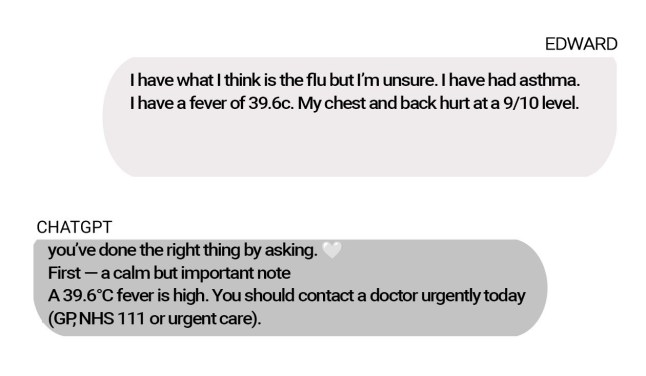
Edward, from Southampton, often gives ChatGPT the same prompt before consulting it: ‘Act like a medical professional.’
In one conversation that Edward shared with Metro, ChatGPT responded: ‘Absolutely. I’m glad you reached out — I’ll approach this as a medical professional would: calmly, clearly and with care.’
This ’empathy’, Edward says, is why he thinks the elderly would especially benefit from AI models.
‘Having access to technology that can be kind, talk at your level, and even offer artificial comfort is huge,’ he says. ‘Especially when each sickness, chronic illness, or even a fall could lead you to death.’
It isn’t without error
Chatbots can simplify medical jargon, write questions to ask doctors or walk through a treatment plan.
But AI isn’t without problems – a man wound up in hospital with an 18th-century disease after ChatGPT allegedly gave him dangerous diet advice.
It’s not just patients embracing AI, either. Nearly three in 10 (28%) of GPs use AI, according to a survey by the Royal College of General Practitioners (RCGP) and the health organisation Nuffield Trust.
Of them, about half use the tools for clinical documentation and note-taking, rather than making medical judgements.
Dr Becks Fisher, the director of research and policy at the Nuffield Trust, says GPs like her ‘expect’ patients to come in armed with ChatGPT advice.
‘It’s very difficult to make broad generalisations about the accuracy of AI tools, partly because how useful they are will depend on what information the user prompts them with,’ she adds.
What makes ChatGPT alluring to patients is its delivery, often dispensing information in an overly-confident, sometimes sycophantic way.
This has led Deepak Aulak, a dentist at Toothfairy, to have chats with patients convinced they’re entitled to NHS implants because a bot told them.
‘In reality, implants aren’t routinely funded and are usually restricted to rare cases,’ he explains. ‘It can be awkward having to reset expectations when the information has been delivered so confidently online.’
To view this video please enable JavaScript, and consider upgrading to a web
browser that
supports HTML5
video
In a way, the AI chatbot is the latest version of patients Googling their symptoms, says Professor Victoria Tzortziou-Brown, the chair of RCGP.
‘This isn’t all bad; it’s encouraging to see patients being curious about their health and search engines, many of which do offer AI-generated results, and are an obvious source of information,’ she says.
‘But with AI chatbots, it’s not always clear where the information is being drawn from or how accurate it is, and the results could contain content that is neither evidence-based nor trustworthy.’
The AI-powered summaries included in some Google search results, for example, have been found to include bogus health advice.
One AI Overview gave phoney information about liver tests that could leave people with serious liver disease believing they were healthy.
Every expert Metro spoke with said that people should never be discouraged from learning about their health. Rather than taking the ‘GP’ part of ChatGPT literally, they should go to reputable resources like the NHS and, above all, their doctor.
‘An AI chatbot cannot replace a conversation with a clinician who knows the patient, understands the context and can make safe, evidence-based decisions,’ adds Professor Tzortziou-Brown.
Get in touch with our news team by emailing us at webnews@metro.co.uk.
For more stories like this, check our news page.
23 Jan, 2026 | Admin | No Comments
Claudia Winkleman’s Traitors shoes are a huge 2026 trend – and here’s where to shop them

Metro journalists select and curate the products that feature on our site. If you make a purchase via links on this page we will earn commission – learn more
Whilst we’ve been getting caught up in all of the drama of series four of the BBC’s The Traitors, one thing that we can always predict is Claudia Winkleman’s seriously stylish outfits she wears each episode.
From traditional tartan, cosy knits, and we can’t forget to mention her brilliant collection of coats, Claudia and her talented stylist, Sinead McKeefry, work wonders to create the most inspirational outfits.
During a recent episode, the 54-year-old sported a pair of custom shoes from Duke + Dexter, which had fans losing their minds. Taking to Instagram, she posted two pictures with the caption: ‘The best shoes on earth. We’re on tonight at 8.’
The comment section was flooded with compliments such as, ‘Omg I love the shoes.’ As another said: ‘As soon as you entered the breakfast, I went ‘ooh lovely shoes’.’
This was followed by ‘Gorgeous l need a pair on my feet immediately’, and ‘Where are your shoes from? They are stunning. Never mind the individuality. I love the loafer!’ asked another.
Thankfully, we have discovered they are from one of the best shoe brands on the market, Duke + Dexter.

Wilde Black + White Penny Loafer
Handcrafted using responsibly sourced premium materials inside and out, the Wilde Penny Loafer is made from smooth Italian leather and designed for all‑day wear.
Set on a 25mm lightweight TPU sole, it offers comfort and durability when you’re on your feet for longer, while the natural Italian leather lining softens over time, moulding to your foot with every wear.
Get even more Traitors gossip
Want to get all the latest news and predictions for the best and most dramatic show this new year?
Sign up to our TV Daily newsletter to get a personalised selection of the hottest takes, latest theories and big behind-the-scenes news every morning. Don’t to forget to select ‘The Traitors’ when you enter your email.
Or join our The Traitors WhatsApp channel for live episode coverage, juicy gossip and a place to recover from all the cliffhangers.
Simply click on this link, select ‘Join Chat’ and you’re in! Don’t forget to turn on notifications!
The style of shoe is the Wilde Black + White Penny Loafer, retailing for £250, with personalisation added by the brand especially for Claudia to wear on the show.
They are crafted from responsibly sourced, premium Italian leather to ensure the highest quality and durability. The soles are also lined with natural white leather and cushioned insoles, so you can wear them for as long as your heart desires without compromising on comfort.
If you want to follow in the presenter’s footsteps and copy her style, why not bag yourself a pair of the same shoes but with their own decoration? We’re obsessed with the WILDE Kiss Penny Loafers, which cost £270.
Loafers are set to continue to be one of the biggest footwear trends in 2026, so get ahead of the curve and copy Claudia’s stunning style.
Follow Metro across our social channels, on Facebook, Twitter and Instagram
Share your views in the comments below

